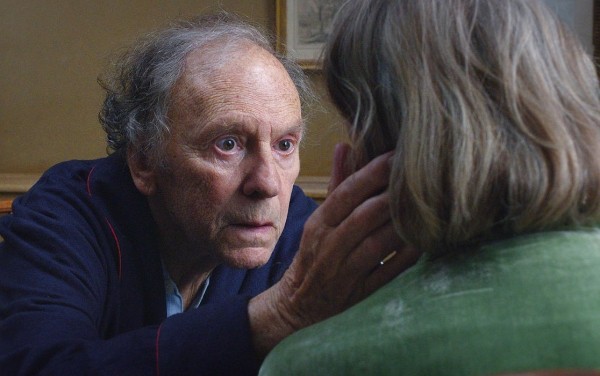
- Amour
Early on in Michael Haneke’s harrowing, moving Amour, 80-something-year-old Georges Laurent (Jean-Louis Trintignant) brings his wife, Anne (Emmanuelle Riva), back home to their Paris apartment to a life that has changed forever. Having suffered a stroke during surgery, Anne has been left paralyzed on the right side of her body and requires Georges’ aid to move from her wheelchair to a chair in their living room. As he lifts and moves her the few required inches, the action first resembles a simple embrace, and then the kind of awkward, tentative slow dance you’d expect to see at a middle school. And in a way, we’re watching a relationship of nearly 60 years cycle back to that point: a moment of affection overlaid with the frightening uncertainty of what will happen next.
The film’s title quickly became something of a film buff in-joke leading up to Amour’s debut at the 2012 Cannes Film Festival, as Haneke’s filmography to that point—including disturbing psychological dramas like Funny Games, The Piano Teacher and Caché—suggested it was more likely to be ironic than sincere. But Amour turns out to be a love story in the most profound way possible. Haneke’s uncompromising sensibility proves a perfect match for this tale of what happens long after the “happily ever after.”
It’s easy to understand if a basic plot description makes Amour sound too depressing to endure. Indeed, it follows a trajectory that offers little hope for a conventional happy ending, opening by showing us Anne’s dead body already being discovered in their apartment. From there, we slip back to the couple’s retired normalcy, the first signs of Anne’s condition, Georges and Anne’s adjustment to their new reality, and setbacks that lead Anne to be increasingly dependent on Georges and in-home nursing care. Throw in conversations that suggest Anne is ready to be “put out of her misery” fairly early on and, sure, you’re not settling in with a bucket of popcorn for a barrel of laughs.
Yet Amour is so remarkably clear-eyed in its depiction of its situation that it turns into an absolutely engrossing character study. Riva has been praised copiously for her performance—including with an Oscar nomination—and she certainly deserves every last bit of it. Unlike so many awards-grubbing performances over the years, Riva’s work is anchored by a fierce determination to hold on to her dignity.
And Haneke captures that sensibility with the most heartbreaking grace in a single cut: from the moment in which the incapacitated Anne is first placed in a diaper, to a flashback in which the retired music teacher is still able to play effortlessly at the piano.
Ultimately, however, the story is perhaps more about Georges, and Trintignant’s performance is stunning in its complexity. While he becomes the tender caretaker who washes Anne’s hair, assists her with her physical therapy and helps her use the bathroom, he’s never portrayed as a saint. His frustrations erupt in his conversations with his well-meaning daughter, Eva (Isabelle Huppert), and son-in-law, Geoff (William Shimell), when they question the course of action he’s taking; his anger similarly boils over when he’s dissatisfied with the care provided by one of Anne’s nurses. He’s driven to terrifying nightmares of suffocation and disaster, and lashes out at one point in a way that’s as shocking to Georges himself as it is to the audience.
There’s an almost throwaway bit near the beginning of Amour, before Anne’s medical problems manifest themselves, when Georges and Anne return from a night out to discover that someone has tried to break into their apartment. It’s a hint at a deeper sense of what Amour is about in its portrayal of old age: reaching that point where fear begins to creep into much of the way we see the world, fear that we’re no longer up to the threats that life throws at us. And perhaps that’s the way in which Haneke is ultimately more of an optimist than we’d all expected of him, showing the ways in which we can be stronger in the face of challenges than we ever thought we could be.
During a conversation with Eva about her marital difficulties, Georges asks her if she loves Geoff; “Yes, I think so,” she replies. Amour takes that hesitant answer to the next amazing step: If you can’t see yourself doing this, you don’t really know what love is.
AMOUR
![]()
Jean-Louis Trintignant, Emmanuelle Riva, Isabelle Huppert
Rated PG-13